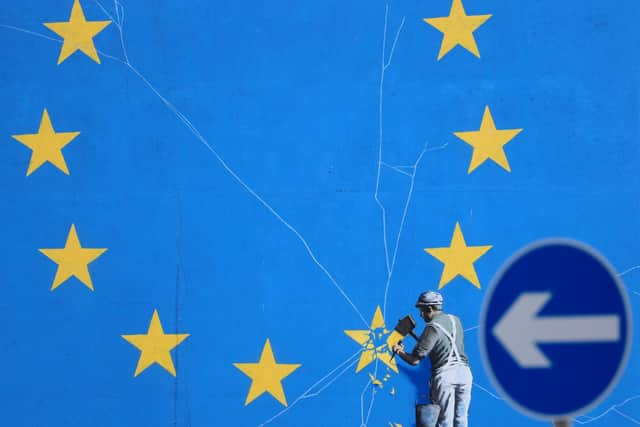Five years on from Brexit referendum we still define ourselves by how we voted, says Leeds academic Stephen Coleman
Professor Stephen Coleman of the University of Leeds says Brexit has "become the new placeholder in politics" and is an easier way of understanding people's political views than whether they vote Conservative or Labour.
A poll this week revealed that five years on from the historic 2016 referendum vote which led to the UK leaving the European Union, the country remains as divided as ever over Brexit.
Advertisement
Hide AdAdvertisement
Hide AdThe survey by Savanta ComRes found that if the referendum was re-run today the result would be a narrow win for Remain - by 51 to 49 per cent - if undecideds are discounted.


That compares to the actual result in June 23 2016 poll of 51.9 per cent for Leave to 48.1 per cent for Remain. However, if the question was put differently with the choice of the UK rejoining the EU, the result would be reversed with 51 per cent in favour of staying out.
In Yorkshire voters backed Brexit by 58-42 in 2016 and all but three parts of the region - Leeds, Harrogate and York - supported leaving the EU.
And Prof Coleman, a Professor of Political Communication, said recent opinion polls showed people nationally were "still very much a Brexit mindset".
Advertisement
Hide AdAdvertisement
Hide AdHe pointed to separate polling which showed that 68 per cent of people defined themselves by how they voted in the referendum and 48 per cent by how they voted in the 2019 General Election.
He told The Yorkshire Post: "So if the question is, 'is there still the same kind of split as there was in 2016 when the referendum happened and then in the years after when it was being debated', the answer's yes.
"And I think people are still talking about the same things. One of the ways in which they are talking is in terms of cultural narratives rather than economic narrative.
"This never was primarily about economics except for a very small number of people who were the ones who really pushed hard to make it happen, but for the average voter it was about culture and it was about history.
Advertisement
Hide AdAdvertisement
Hide Ad"What does it mean to be British, who should come into the country, where is the country positioned in the world, who is it close to? And those are kind of cultural questions, the statistics I've mentioned suggests they just persisted for at least half or getting on to two thirds of the population. That is how they still define themselves.
"When I do things like focus groups of people, they don't talk about voting Labour or Conservative any more, they talk about Brexit because that is something they can understand, if you are for Brexit you can understand who is against it.
"And if you're against it, you can understand who is for it. But if you're Labour you can't necessarily understand who voted Labour in other parts of the country, because there's no clear narrative.
"And with Conservatives, you have Conservatives up here in the North, who are voting because they think the Conservative Party is going to do what Labour used to do which is spend more on them, and then you've got people that are voting Conservative for the old reasons, nobody quite knows what parties mean anymore, but Brexit has become the new placeholder in politics."
Advertisement
Hide AdAdvertisement
Hide AdBoris Johnson said this week that the historic vote five years ago to leave the EU will now act as a spur to jobs and renewal across the UK as it recovers from the pandemic.
In a statement to mark the anniversary on Wednesday, the Prime Minister said it is his "mission" to use the freedoms it gave to deliver a better future for the British people.
However, in a sharply contrasting message, the veteran pro-European Lord Heseltine said the outlook was "ominous", with the Northern Ireland peace process under real threat.
Prof Coleman, who recently wrote the book 'How People Talk About Politics, Brexit and Beyond', said the pandemic meant some of the "massive" consequences of Brexit were not being discussed.
Advertisement
Hide AdAdvertisement
Hide AdHe said: "We've had a 50 per cent cut in the amount of food that the UK is exporting to Europe. If anyone would have said at the time when this was being debated 'half of all food products go into Europe have been cut' people would have said that's dramatic one way or the other, but it's happened without people noticing the changes, the fall in GDP.
"And then the constitutional things around Scotland and Northern Ireland in particular are going on in a way that have gone under the radar. We were in the middle of this massive change in our national history when something else came along that was even more massive, and made us forget what we were in the middle of."